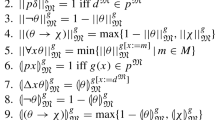Abstract
Intuitionistic dependence logic was introduced by Abramsky and Väänänen [1] as a variant of dependence logic under a general construction of Hodges’ (trump) team semantics. It was proven that there is a translation from intuitionistic dependence logic sentences into second order logic sentences. In this paper, we prove that the other direction is also true, therefore intuitionistic dependence logic is equivalent to second order logic on the level of sentences.
Similar content being viewed by others
References
Abramsky S., Väänänen J.: From IF to BI. Synthese 167(2), 207–230 (2009)
van Dalen, D., Intuitionistic logic, in L. Goble, (ed.), The Blackwell Guide to Philosophical Logic, Blackwell, 2001, pp. 224–257.
Enderton H.B.: Finite partially-ordered quantifiers. Zeitschrift fur Mathematische Logik und Grundlagen der Mathematik 16, 393–397 (1970)
Hintikka, J., and G. Sandu, Informational independence as a semantical phenomenon, in J. E. Fenstad, I. T. Frolov, and R. Hilpinen, (eds.), Logic, Methodology and Philosophy of Science, vol. 8, Amsterdam: Elsevier, 1989, pp. 571–589.
Hodges W.: Compositional semantics for a langauge of imperfect information. Logic Journal of the IGPL 5, 539–563 (1997)
Hodges, W., Some strange quantifiers, in J. Mycielski, G. Rozenberg, and A. Salomaa, (eds.), Structures in Logic and Computer Science: A Selection of Essays in Honor of A. Ehrenfeucht, vol. 1261 of Lecture Notes in Computer Science, London: Springer, 1997, pp. 51–65.
Kontinen J., Nurmi V.: Team logic and second-order logic. Fundamenta Informaticae 106, 259–272 (2011)
Kontinen J., Väänänen J.: On definability in dependence logic. Journal of Logic, Language and Information 18(3), 317–332 (2009)
Nurmi, V., Dependence Logic: Investigations into Higher-Order Semantics Defined on Teams, Ph.D. thesis, University of Helsinki, 2009.
O’Hearn P., Pym D.: The logic of bunched implications. Bulletin of Symbolic Logic 5(2), 215–244 (1999)
Pym, D., The Semantics and Proof Theory of the Logic of Bunched Implications, Kluwer Academic Publishers, 2002.
Väänänen, J., Dependence Logic: A New Approach to Independence Friendly Logic, Cambridge: Cambridge University Press, 2007.
Walkoe W.J.: Finite partially-ordered quantification. Journal of Symbolic Logic 35, 535–555 (1970)
Yang, F., On Definability in Intuitionistic Dependence Logic, manuscript, 2010.
Author information
Authors and Affiliations
Corresponding author
Rights and permissions
About this article
Cite this article
Yang, F. Expressing Second-order Sentences in Intuitionistic Dependence Logic. Stud Logica 101, 323–342 (2013). https://doi.org/10.1007/s11225-013-9476-5
Published:
Issue Date:
DOI: https://doi.org/10.1007/s11225-013-9476-5



